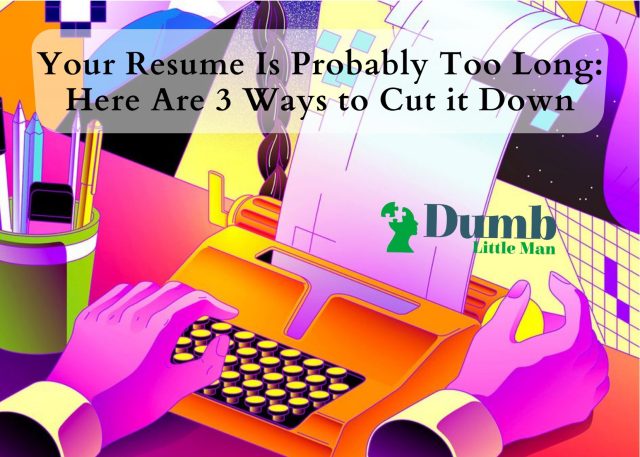Your Resume Is Probably Too Long: Here Are 3 Ways to Cut it Down

Are you having a hard time trimming down your resume? You're not alone. Many people tend to include too much information on their resumes, thinking it will look better to potential employers.
However, this can have the opposite effect. Employers don't want to read through a long document full of irrelevant information – they want to see the most important details quickly and easily.
This blog post will discuss three ways to cut down your resume and make it more appealing to hiring decision-makers!
First: Keep Your Resume to 1-2 Pages In Length
It used to be common practice to keep your resume to a single page. However, with changing preferences thanks to a more competitive market, this is no longer always necessary. Many recruiters accept or even prefer up to two pages of information on your resume if it’s truly necessary for all of your relevant accomplishments.
But more than two pages? Not a good idea! If your resume is longer than two pages, you're likely including too much information.
How to determine if you need a two-page resume:
Experience in your niche is a significant determining factor in whether or not your resume will require a second page. If you're relatively new to your field or don't have much experience, you should probably stick to a one-page resume.
On the other hand, if you have more than 10 years of experience or have held multiple involved positions in your field, a two-page resume may be necessary.
Your Niche & Industry Play An Important Role
Every resume, just like every job, is unique. The niche and industry you work in will also affect how long your resume should be.
For example, if you're applying for a job in the medical or engineering fields, you'll likely need to include more information on your resume than someone applying for a career in the retail industry.
Being self-employed or holding a few, long positions within the same company can make for a shorter resume than if you’ve held many relevant jobs.
In general, it's always a good idea to tailor your resume to the specific job you're applying for. This will ensure that the information included is relevant to the position and helpful for the employer’s decision between you and other candidates.
3 Ways To Keep Your Resume as Short as Possible
Follow these three suggestions to help you keep your resume brief and to the point, while still providing the information employers need to see. Remember that your goal is to create an easy-to-read document that highlights your most important qualifications.
Pro tip: use white space to your advantage and keep your resume looking clean and organized. The right font and line spacing for your resume can make a big difference!
1. Keep Your Experience To The Last 10-15 Years (ideally)
If you have a long work history, including every job you've ever had is unnecessary. Start with your most recent experience and work your way back only about 10 or 15 years, depending on the job you’re applying to. Employers are most concerned with what you’ve done recently, and once you go past 10-15 years your experience stops being as relevant. Nobody needs to know that you were a Sales Associate 20 years ago if you’re applying to be a Director of Marketing now.

As with most resume tips, this is a general rule – there might be a situation in which you have a remarkably notable position from earlier in your career. It all depends on the experience and qualifications needed for the particular position you're applying for. Keep this in mind, and you’ll keep your resume relevant and concise.
2. Eliminate Irrelevant Information
The goal of a resume is to highlight your skills and qualifications as concisely as possible. To do this, you must avoid including anything that’s irrelevant to what the company will be hiring for, such as personal details like hobbies and interests outside of work hours, even if they seem pertinent!
While you may want to include your entire academic history, only list the degrees and qualifications relevant to the job position.
The same goes for any professional development courses or training programs you've completed. Only include those related to the position or that will give you an edge over other candidates. For instance, if you’re applying for a new job as a nurse, you don’t need to list all of the UX certificates you picked up in an earlier career path.

Bullet points can help you resume concisely providing relevant accomplishments. But if they are only used to highlight less important data (like every youth center you volunteer at on Saturdays), you are just taking up valuable resume space.
Unless the company specifically asks you to include these more personal details, leave them off your resume.
Focus On Your Achievements, Not Just Your Job Duties
When listing your experience, it's important to focus on your achievements rather than simply stating your job duties. This will give employers a better idea of what you're capable of and what you have accomplished in your career.
3. Cut Out Filler Words And Lengthy Sentences
Resumes are not the time or place for lengthy descriptions or flowery language. Be direct and to the point in your writing.
Use action verbs and specific adjectives to describe your experience and skills. And avoid using filler words like “responsible for” or “duties included.” If a bullet point or sentence is longer than two lines, it's probably too long. Consider breaking it up into shorter, more straightforward sentences or bullet points.

Speaking of bullet points, they can take up extra space that you can cut out in some cases. Do you know how sometimes you have a thought that doesn't need any additional words? Look for this in the bullet points that hang over onto the next line by just one or two words. Be sure to reword the bullet to remove these “Orphan” words as they often take up two lines of text when they could instead only use one. Edit carefully! There are plenty of apps, like Grammarly, that can help with this.
You can also try reading your resume aloud if you're unsure whether a sentence is too long or has too many filler words. If it sounds like something a robot would say, it's probably best to cut it down (or out) entirely!
Conclusion
Your resume is an important tool that can help you land the job you want. But if it's too long, it may not be as effective as it could be. Use these tips to help you simplify your resume and make sure it highlights your most relevant experience and qualifications!
Chris Villanueva
Chris Villanueva, CPRW is the founder and CEO of the award-winning resume service Let’s Eat, Grandma (because good writing is so important that it can save a life!) With a highly trained team of writers and a focus on customization for each client, Let’s Eat, Grandma has helped thousands of professionals get closer to their dream job with better resumes, cover letters, and LinkedIn profiles.


